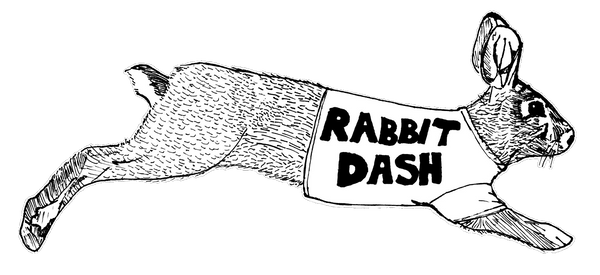I'm a coffee shop manager. When someone asks you what you do for a living, it's best to keep it straightforward and recognizable. Three-word titles are dangerous; you usually lose people about halfway through the second word as they begin to wonder what you actually do and if this was what you always wanted to do.
I started working at Rabbit Dash when I was 24. I came to it after a series of bad jobs and it immediately felt like home. This was the original location, back in 2018. My best friend, and your favourite barista, Bri, already worked there and I quickly found a family in the rest of the team. We would hang out outside of work and celebrate holidays together. Jon and Kristy (and Aaron) came to my wedding the following year.
The lines between work and life blurred a bit. In the best way.
COVID happened. We opened a second store; our business changed and grew and I came out the other side as Company Manager. My job became something more permanent, something closer to a career. A few more years have passed and I am now in the final months of my twenties. As this chapter of my life closes, I can't help but take stock of my situation: married, two dogs, a home. I'm what most people would call "settled", except for my job.
There is a persistent stigma that food service jobs are not real jobs. People assume you work in food service as your first job, or while you're studying for your career...or if you can't do anything else. All of this is nonsense, of course. Jon has been actively proving that assumption wrong for years by providing those of us who work full-time with all the perks of a "real" job - livable wages, consistent schedules, and benefits. I bring this up so that you, the reader, can think about how a job in a cafe can and should have dignity, just like any other.
To put it simply, it's ok to just work at a coffee shop.
Ironically, I am working at a job in my field. I have a diploma in travel and tourism, which involved whole courses in restaurant management. I went on to get a certificate in event management, which has come in handy on numerous occasions. I am proud of my education but I have to be honest: I went to post-secondary school because I felt like I had to. I worked hard, but I wasn't really passionate about seating arrangements, kitchen budgets and flight schedules. I am a whole, complete person and my degree didn't define me, no more than my job can define me now. I am proud of my work. I care about our business and our customers and I genuinely love all my co-workers. It's a big part of my life, but it's not my whole life. It's not my dream, and that's ok.
When someone tells me what they do for a living, I imagine looking at a route on Google Maps to a new destination - you can get an abstract idea of that journey. When you get to know someone and understand their story, it's like actually driving that route. If you're lucky, you see everything in detail, step-by-step; the destination, what they do for work right now, loses importance.
Faith Brierley

